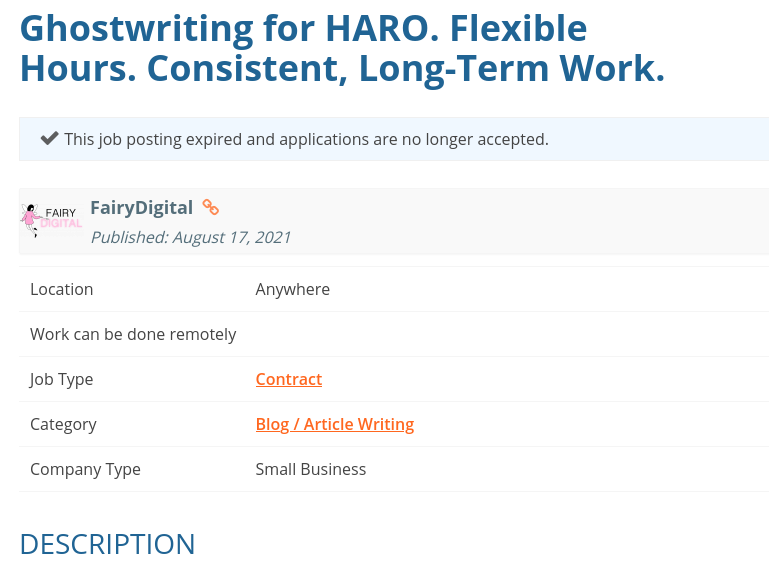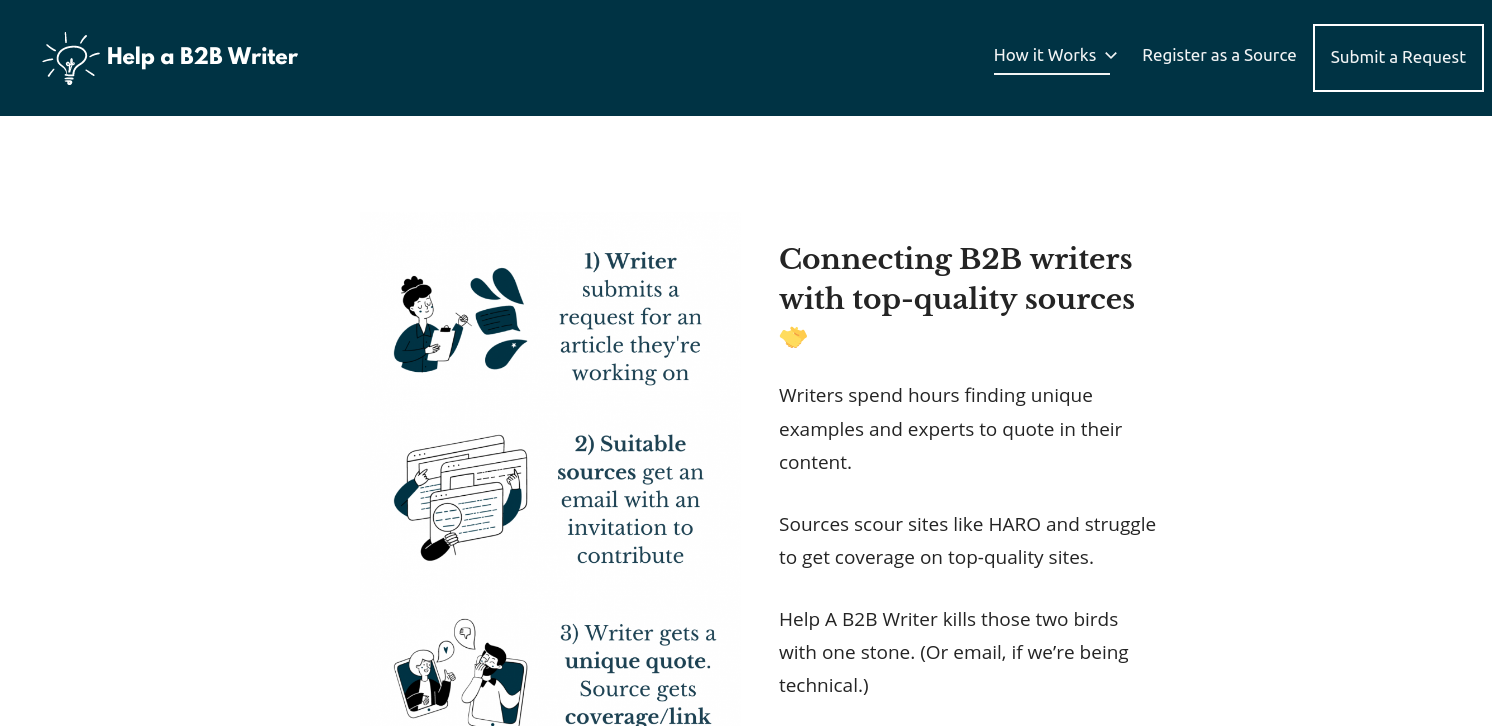Resources
Hey Writers—You’re Probably Using HARO Wrong
By Derick Okech April 5th, 2022For a long time, Help a Reporter Out (HARO) was the go-to resource for freelance writers and journalists looking to include insights from experts in their content. If you were seeking a source in a super-niche field, you may have found fifteen excellent ones on HARO—including a range of academics, executive-level professionals, and startup founders.
But as of late, the responses—and requests—from HARO users have baffled me. They seem much more self-serving than they used to be.
I’m not alone in this observation. I spoke with a few other writers who feel similarly—and got their take on some HARO alternatives.
Has HARO gone awry?
For those unfamiliar with the service, HARO caters to journalists, subject matter experts (SMEs), and public relations teams. It offers writers the opportunity to submit “queries” to look for sources, and it offers SMEs and brands a chance for exposure by connecting with journalists who cover relevant beats.
Bernadette Geyer, a writer, editor, and author, noted the platform is still the largest centralized resource for expert sources. “New journalists who have a hard time [establishing] an extensive network of experts to interview may find it a good place for valuable insights to put in their articles,” she said.
Other writers and editors still sing the platform’s praises:
Broken record Ashley popping in to say – I'm SO grateful for @helpareporter. If you're not using it to set yourself up as an expert, you should!
HARO is SO helpful for freelance writers like me looking for feedback on a wide variety of topics. I LOVE the platform so much! pic.twitter.com/rC64IcV0Rm
— FamousAshleyGrant (@AshleyisFamous) July 26, 2021
Ok, for those of you who want to be mentioned on big platforms… Get on HARO!!
Just today, I saw a buch of journalists asking for a perspective from Black women and bloggers.
— Tamara Sykes 🇧🇧 (@baydiangirl) September 28, 2020
To me, however, it seems like today’s HARO responders often want to fit into the niche subject you’re discussing—whether or not they’re experts.
“I would be surprised if the [percentage] of genuine sources to spammy marketers was more than 25 to 75,” said Dominic Kent, a writer and content director at @Mio, a cross-platform messaging service. “Sources who wish to build credibility are being flooded out.”
Stella Inabo, a content manager and writer at Animalz, a content marketing firm, agreed with this observation. “The problem with HARO is that even after specifying in your request that you only need to speak to specific people, you still find those with no niche expertise responding,” she said. “It affects the quality of responses.”
Beware ghostwritten HARO replies
These days, the “experts” that respond on HARO might not even be what—or who—they seem. In fact, there are entire businesses dedicated to ghostwriting HARO responses. These companies hire writers to respond to media queries, apparently caring little about the ethical implications. 
Caitlin Kelly, a New York-based journalist and writing coach, said that this new trend may be why so many people don’t seem to know how to use HARO properly. “When you ask for X, they say ‘I represent X.’ But they just want to sell you something for their response to be included in a post,” she lamented.
The reason for HARO’s shift is likely multifaceted. My speculation is that as the media landscape changed dramatically over the past few years, HARO loosened some of the requirements to use its platform.
But while this was an excellent way to allow diverse groups of professionals (journalists, bloggers, influencers, and B2B writers) to use the service, it seems HARO forgot to adjust its regulatory safeguards. This opened the gates to shady marketers looking to exploit the system by posing as experts.
What HARO is still valuable for
While HARO isn’t what it used to be, the platform still has value for writers. Here are a few ways you can use it effectively:
- To gain insights into trending topics: You can uncover trending topics by skimming through HARO requests. Signing up as a “source” for pitches in a specific topic may also help you gauge popular themes that other writers are exploring.
- To find niche publications to pitch to: If you’re looking to break into niche or specialty publications, Geyer noted you can use HARO to find names of lesser-known sites or brands. You can then pitch them stories—or just share your perspective to get on their radar.
- To seek marketing advice: The fact that HARO is flooded with marketers makes it bittersweet. On one hand, these PR pros, content strategists, growth hackers, and B2B writers may be hungry for links. On the other, their advice might apply to your own marketing campaigns. For example, if you’re writing a story on how to market a business on Twitter, you can use the tips from HARO responses to market your own services.
HARO alternatives
For those writers and journalists pining for the good old days, never fear—there are a few HARO alternatives you can tap.
Help a B2B Writer, for instance, is a platform created by freelance B2B journalist Elise Dopson. She launched the site to help other freelancers find quality sources and avoid being barraged by spammy ones. Its biggest plus is its niche targeting—the competition for sources isn’t as tough as it is on HARO.

Twitter is another goldmine. Writer Komal Ahuja, for instance, used the platform to compile a list of sources by creating a thread. Writers and editors can also put out direct calls for pitches, as healthcare writer Frances Gatta demonstrated in a recent tweet.
I’m not able to find many women experts to gather quotes from for my articles, surprisingly. So, women in marketing, sales, eCommerce, CRO, SMS—where you at?
I want to include you in my list so I can reach out next time. Tag the rockstars you know!
— Komal Ahuja (@Komallahuja) February 22, 2022
I need to connect with a doctor who can provide quick comments on whether it's safe to travel in 2022 for a piece I'm working on.
It's due today, so I need someone that can answer me as soon as it's convenient for them.
dm or email frances@francesgatta.com#journorequest— Frances Gatta (@francesgatta) March 22, 2022
Finally, you can tap into your own professional network. This might require a bit more legwork than simply filling out a form on HARO, but you may be more likely to find a viable—and reliable—source for your content. Even if your own network doesn’t contain a perfect fit, you never know which of your contacts can introduce you to someone awesome.
If you use it (and use it correctly) for certain tasks, HARO can still be helpful. But, as Kent put it, today’s version of the platform is a bit of a roulette wheel. In my opinion, it’s time to stop relying on the service so heavily. Sorting through dozens of irrelevant and spammy replies has diminished HARO’s original purpose—to save writers and journalists time.
Image by StorySet